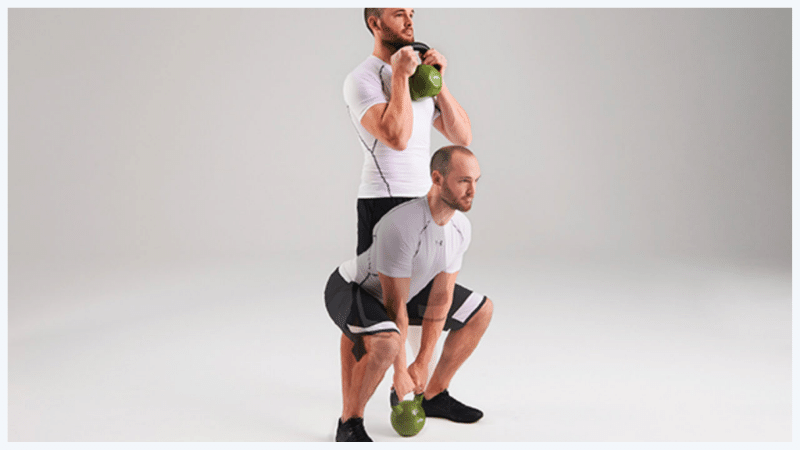Slow and steady is not the only way to train safely.
Although controlled reps are a great way to create muscle tension and have a great workout, doing exercises explosively adds other benefits that shouldn’t be overlooked.
Explosive training can help you build more muscle and strengthen all your muscle groups by targeting your fast-twitch fibers. And, training with speed builds power, which is something that becomes more important as you age. Not to mention, more power helps with popular exercises like deadlifts, squats, and bench press,
However, most people aren’t sure how to move explosively without putting safety at risk. The answer is exercise selection.
Many traditional full-body power moves — such as barbell cleans — carry an increased chance of injury. It can take time and practice to develop upper body mobility, or hours of in-person coaching with a personal trainer to learn the finer points of very technical lifts. But, that doesn’t mean you need to abandon “power” movements in your workouts.
You can simply do bodyweight exercises more explosively, including things like jumps (with a bodyweight squat or lunge), bodyweight rows, or pushups. Or, you can select variations of power movements that are a little less complicated to learn, and, therefore, safer for you to perform. Enter the kettlebell goblet clean.
Why Kettlebell Goblet Clean Is So Effective

Kettlebells can be confusing for some people because of the handle, but they also provide a lot of variety that can make it easier to learn or modify exercises.
Unlike barbell cleans (or even the kettlebell clean), a kettlebell goblet clean helps you train explosive leg drive with minimal upper body movement. With most clean exercises, you have to “catch” the bell or bar in what’s called the rack position (resting on your arm and upper chest). This is the same position as barbell front squats, only, instead of starting with the bar in position, you need to catch it during the lift.
The kettlebell goblet clean doesn’t require finishing in the rack, which is what makes it difficult for some and can lead to injury. Whenever you hear the term “goblet,” it means you’ll hold the KB with both hands in front of your chest.
Here’s what makes this movement so effective: taking the kettlebell from the floor to the goblet position only requires relaxing your grip. That’s it. You won’t need to bang up your wrists and forearms for weeks while you learn it.
This makes it an ideal move for beginners. You’ll be on your way to mastering the lift your first day. And you’ll learn how to safely get a heavy bell into the starting position for goblet squats without tweaking your lower back. Win-win.
The entire movement is great for building lower-body explosiveness that will strengthen your hamstrings and glutes. As you get better, you can try “catching” a single kettlebell or progress to a double-kettlebell clean. Or, you can just keep adding weight and never have to worry about the “catch” aspect. The variety is part of what makes the exercise so effective.
How To Do It
- Stand with your feet slightly wider than shoulder-width. The kettlebell should be centered between your legs.
- Unlock your knees and push your hips back until you can grip the kettlebell handle. The starting position will be very similar to a deadlift.
- Driving through your legs and butt, stand up quickly. Keep your arms close to the body. The kettlebell will travel straight up like it’s on an elevator.
- If you provide the pop with your legs, the bell should be “floating” now and feel weightless. As it reaches your chest, relax your grip and rotate your elbows around the kettlebell. Your hands will slide slightly down the handle.
- Relax your grip again to return to the start position by reversing the steps.
Most of the time we want to train power at the beginning of the workout (after a warmup). That’s when you’re fresh, have less fatigue (which can lead to fatigue), and your technique is likely to be sharper. It’s why 50 reps of box jumps (a power exercise) likely isn’t a good idea at the end of your workout (not to mention, 50 reps of any power exercise probably isn’t a good idea).
Working on explosive movement at the beginning of a workout can also prime your muscles as you progress to working with heavier weights (to focus on building strength) or moderately heavy weights with more reps to build muscle.
As you progress and master the movement, you can also integrate explosive movements into a complex or circuit, typically keeping the reps a little lower.
Try this workout
After a warmup, do 5 reps of kettlebell goblet cleans, 5 goblet squats, and then 5 kettlebell swings without setting the bell down.
Rest 1 minute.
Complete 5-10 rounds for a quick, do-anywhere lower body blast.
